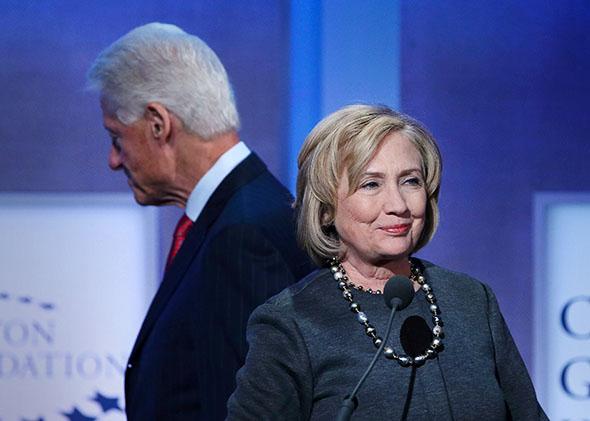There’s a certain rhythm to Clinton Cash: The Untold Story of How and Why Foreign Governments and Businesses Helped Make Bill and Hillary Rich, the most recent tome from conservative writer Peter Schweizer. Take his chapter on the Clintons and India—titled “Indian Nukes: How to Win a Medal by Changing Hillary’s Mind”—which makes the case that Hillary switched gears on an India-U.S. nuclear deal after donations from various Indian elites. After detailing the history of the bill, Clinton’s early skepticism, and Bill’s relationship with prominent Indian donors and officials, Schweizer makes a bold claim:
Hillary had not been a supporter of the bill, and her closest aides were all opposed to it. But in September 2008, as the bill’s fate hung in the balance, Amar Singh made a visit to New York to see Hillary. Joining him for a private dinner with the senator was Sant Chatwal. Opposition to the bill had come primarily from Democrats. Hillary had supported the “killer amendment” two years earlier. According to Amar Singh, they had a two-hour dinner. In the days following, he was confident the deal would go through, based on what he heard. Having grown accustomed to the deal making and influence buying ways of the Indian parliament, he was open with the Indian media about what transpired in New York. (Hillary Clinton probably considered herself fortunate that his comments were never reported in American media.)
The structure is clear. Schweizer makes several statements of fact—either through quotes or paraphrasing—but doesn’t ever build connective tissue between them. Instead, he lets them stand, and lets the reader draw the conclusion that Schweizer outlines in the very beginning: that Bill and Hillary traded influence for cash and donations.
But for as much as he can make the Clintons look bad with lurid examples of iffy transactions—Chatwal, for instance, arranged a $450,000 speaking gig for Bill Clinton—Schweizer never gets around to giving definitive proof of illegal deals or unethical behavior. Take the India affair: Not only does Schweizer lack evidence of a tit-for-tat between Clinton and the Indian donors, but he gets key details wrong. He writes that in 2006 she was a “reluctant and questionable supporter of the bill,” but in June of that year—notes Politico—she issued a press release announcing her plan to vote for the legislation. Likewise, contra Schweizer, Clinton voted for two of the three “killer amendments” that put safeguards for nonproliferation on the agreement.
It’s this missing evidence that consistently hurts the case for wrongdoing in Clinton Cash. You saw this in the follow-up from outlets like the New York Times on the uranium deal between the United States and a Russian state energy company. Both Schweizer and the New York Times detail donations and associations without showing a causal relationship between the Clintons and any particular deal. And Schweizer, in particular, ignores crucial context. Yes, the Clinton Foundation received donations from the same executives who would benefit from the sale. At the same time, Hillary was just one of a group of officials who reviewed the deal, and she didn’t have the power—as Schweizer claims—to “veto” the arrangement. That the federal government approved the deal after the donations doesn’t mean the donations had anything to do with the deal. To prove otherwise requires a much more exhaustive look at the details of the deal and of the relationships among all the characters.
Schweizer doesn’t just rely on classic logical fallacies. He gets facts wrong as well. In the book’s chapter on Haiti—titled “Disaster Capitalism Clinton-Style”—Schweizer notes that Bill was paid $600,000 for speeches by a company trying to secure a mobile phone contract in the country. He then notes that the company, Digicel, began receiving contracts from USAID, and that Bill gave a speech just weeks before Digicel received its first grant.
But, as a Clinton spokesman told BuzzFeed, “neither the former president nor the Clinton Foundation was paid for two of the three speeches Clinton gave in Ireland, and that while the foundation did receive a donation following his Sept. 29, 2010 speech, Clinton himself was not compensated.” What’s more, the final speech was given a full year before the contract was awarded, and the company itself had a prior relationship with USAID. None of this looks good for the Clintons, and Schweizer might be right about what it means. But he hasn’t done the work to show it.
Overall, Clinton Cash is best described as an exercise in question begging, in which you assume your conclusion in the premise of your argument. Schweizer believes that the Clintons are corrupt influence peddlers who have enriched themselves at the expense of America’s interests, and he’s written a book to justify himself. What he hasn’t done is written a book that proves his claims. Instead, all he has is a compendium of bad decisions and gross behavior that a more sober-minded writer could have used to make a real hit on the Clintons. As it stands, they will brush this off like they have most attacks from the right.
Indeed, there’s a sense in which Schweizer knows that he hasn’t done anything to hurt his intended targets. “I realize how shocking these allegations may appear,” he writes at the beginning of the book. “Are these activities illegal? That’s not for me to say. I’m not a lawyer.”
